On Friday morning, Matthew Warren, son of Saddleback Valley Community Church pastor and Purpose-Driven Life author Rick Warren, died from what Orange County Sheriff’s Deputies describe as a self-inflicted gunshot wound.
Pastor Warren has called his son’s suicide the culmination of “mental illness resulting in deep depression.” Yesterday, Tom McDonald, of the God in the Machine blog, speaks of suicidal depression from an insider’s perspective. His family tree is “full of people who completed their short and tormented lives in a madhouse, at the bottom of a bottle, or at the end of a rope.” Tom’s not at all surprised that Matthew ended his life despite receiving, to all appearances, the best of care. For the mentally ill, modern science’s best is often no good at all. After riding the “roller coaster” of treatment, remission, and relapse for long enough, writes Tom, “It wears on you. It weakens you. In the end, it can destroy you.”
Tom’s piece is a masterpiece, one of the finest essays I’ve read all year, and maybe the best I’ve ever seen on Patheos. It’s so good, I barely resent him for writing it. With his intimate understanding of the suicide’s mindset, he makes the case that what drove Matthew Warren to such drastic measures might not have been despair — one of the few unforgivable sins — but a topsy-turvy kind of hope.
I can’t say either way. But one thing that’s always been clear to me is that many suicides are lovely and even admirable people. Charles Whittlesey, who commanded the Lost Battalion in the Argonne Forest during the Great War, was driven by post-combat depression to leap from a ship bound for Cuba. Red Mike Edson, who commanded the Marine Corps’ Raider Battalion on Guadalcanal, and who was promoted to command even larger bodies of troops later on, killed himself after the war by inhaling carbon monoxide in his own garage. Abraham Lincoln, who suffered through bouts of the profoundest depression, is said to have come to the very brink of self-murder. Some biographers credit him with a poem titled “The Suicide’s Soliloquy.” Its verses include theological speculation:
Hell! What is hell to one like me
Who pleasures never knew;
By friends consigned to misery,
By hope deserted too?
To ease me of this power to think,
That through my bosom raves,
I’ll headlong leap from hell’s high brink,
And wallow in its waves.
Though devils yell, and burning chains
May waken long regret;
Their frightful screams, and piercing pains,
Will help me to forget.
Yes! I’m prepared, through endless night,
To take that fiery berth!
Think not with tales of hell to fright
Me, who am damn’d on earth!
Fr. Jim Martin has made a specialty of writing specialized prayers, including one for suicidal gay teens, and another for frustrated Catholics. Here’s my best effort at a prayer for those who have already died by their own hands:
In the name of the Father, and of the Son, and of the Holy Spirit:
Lord Jesus Christ, Son of the Living God:
“Let this cup pass from Me,” You once prayed. Later, having drunk, and convinced Your Father had abandoned You, You demanded to know why. Still later, you cried, “It is finished.”
O Lord, did that cry signify a kind of relief, perhaps a slight recapturing of perspective? Did You discover, in those last awful minutes on Calvary, why Your Father had made you drink, and why His insistence did not represent an act of abandonment? In short, O Lord, did You get the answer You asked for?
These are rhetorical questions, O Lord. We come before You now to plead on behalf of those who could not drink their cup to the dregs, and who decided to finish their time on Calvary before You willed it.
We humbly beseech You, Lord, to remember that not all suffering is so easily explained, that much of it seems to serve no grand purpose that would ennoble him who suffers.
For our part, we will allow that we often neglect the afflicted, that we fail to extend to them the respect and understanding that might help them see Your design in their pain.
We beg You, O Lord, to recall that You stumbled under Your Cross not once, not twice, but three times, and that, after the third collapse, Your executioners compelled a stranger to carry it for You.
We readily admit that we are often slow to render this kind of assistance. But, Lord, we ask You to recognize that many of our merciful works, no matter how sincere the spirit in which we perform them or how strenuous we may find the effort, fail to lighten the recipients’ burdens to a degree that feels significant.
“Gall for my meat and vinegar to drink” — this, Lord, was someone’s idea of helping.
It is not our contention, Lord, that the people on whose behalf we petition You were unblemished lambs. All were born into sinful flesh; some, like Gestas the Thief, will have earned their Crosses and scorned You for not sparing them the just consequences of their actions.
Nevertheless, Lord, following the instructions of Your Blessed Mother, we make a practice of praying for You to “lead all souls into heaven, especially those most in need of Thy mercy.” In our reckoning, nobody needs Your mercy more than those who never knew of it, had ceased to believe in it, or who had come to reckon it of little value. For that reason, Lord, we call on You to demonstrate to them in a practical way what they were never able to grasp in theory.
Lord Jesus, pour out Your mercy upon them. Receive them as friends. Introduce to them the eternal bliss of salvation, which You gained for them by the sacrifice of Your Blood.
We ask this of You in Your name.
Amen.















